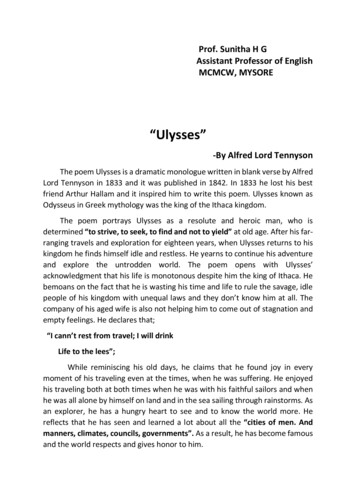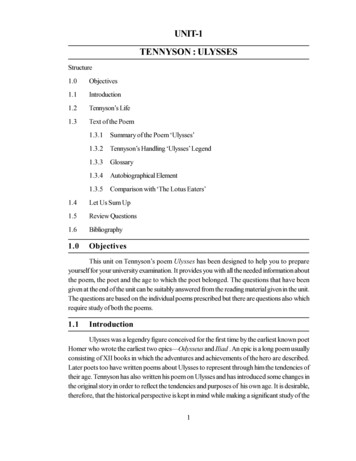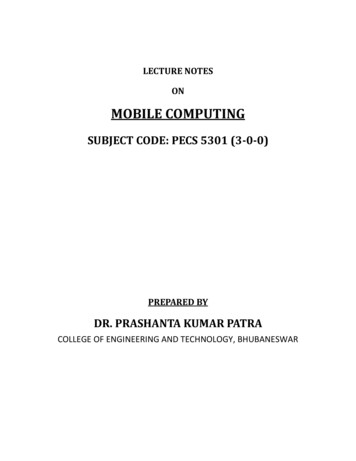
Transcription
Prof. Sunitha H GAssistant Professor of EnglishMCMCW, MYSORE“Ulysses”-By Alfred Lord TennysonThe poem Ulysses is a dramatic monologue written in blank verse by AlfredLord Tennyson in 1833 and it was published in 1842. In 1833 he lost his bestfriend Arthur Hallam and it inspired him to write this poem. Ulysses known asOdysseus in Greek mythology was the king of the Ithaca kingdom.The poem portrays Ulysses as a resolute and heroic man, who isdetermined “to strive, to seek, to find and not to yield” at old age. After his farranging travels and exploration for eighteen years, when Ulysses returns to hiskingdom he finds himself idle and restless. He yearns to continue his adventureand explore the untrodden world. The poem opens with Ulysses’acknowledgment that his life is monotonous despite him the king of Ithaca. Hebemoans on the fact that he is wasting his time and life to rule the savage, idlepeople of his kingdom with unequal laws and they don’t know him at all. Thecompany of his aged wife is also not helping him to come out of stagnation andempty feelings. He declares that;“I cann’t rest from travel; I will drinkLife to the lees”;While reminiscing his old days, he claims that he found joy in everymoment of his traveling even at the times, when he was suffering. He enjoyedhis traveling both at both times when he was with his faithful sailors and whenhe was all alone by himself on land and in the sea sailing through rainstorms. Asan explorer, he has a hungry heart to see and to know the world more. Hereflects that he has seen and learned a lot about all the “cities of men. Andmanners, climates, councils, governments”. As a result, he has become famousand the world respects and gives honor to him.
Ulysses also acknowledges the fact that he felt delighted in fighting theTrojan war alongside his fellow soldiers. He feels all the places and people hehas encountered have been changed including him. All that in the past havebecome experiences for him now and they appear like an arch to him. Throughthat arch, he wants to continue his exploration of the untrodden world.Ulysses exclaims that it is boring to stop and stay in one place without doingany activities. Here he compares himself to a sword that has been allowed torust uselessly without using it in battle. Ulysses declares that bare breathing isnot living and life afterlife would not be sufficient to do all that he desires. Atthe old age, very little time is left over and he is at the end of his lifetime. So hethinks that every little hour left in his life would bring new opportunities toexplore the world. He feels that it would be disgraceful to sit at home, eat andpray to stay alive. His greatest desire is to explore the world and get newknowledge. He yearns to go beyond the humans’ limits like “a sinking star”.In the next part of the poem, Ulysses introduces his son Telemachus, who isthe inheritor of the throne. He asserts his love for his son and applauds his son’sability to carry out the responsibilities as a ruler. He says with patience andprudence, Telemachus will work towards civilizing the savage and idle people ofIthaca and will make them indulge in productive activities. As a rulerTelemachus; “Most blameless is he”. Because in the absence of Ulysses heshows proper respect and affection to his mother and will continue his offeringworship and sacrifices to the Gods that Ulysses most honored. Hence hedeclares that Telemachus is well fit to discharge kingly duties whereas he is fitto continue his exploration of the world.“He works his work, I mine”.Then Ulysses while indicating the sea addresses his mariners, whoworked and explored the world with him to gain new knowledge. He says thatthe sea is calling and the ship is ready to sail beyond the dark sea. He remindshis mariners about their joyful acceptance of both troubles and good luck in theirprevious explorations with all bravery and resolution. Now as Ulyssesacknowledges both he and mariners have grown older but they are still capableof hard work and earn respect before “death closes all”. He urges to accomplishsome great deeds before death takes them all. Because they are all the heroicmen, who fought with the Gods in the Trojan War. As the night is befallingUlysses urges his mariners to join him in the last voyage. Because they are nottoo old to explore the unknown regions of the world. He talks about his goal to
sail beyond the horizon before death takes him away from the world. Heconfesses that during their voyage their ship may get drowned in the sea or theymay reach the Happy isles, where they can see Achilles the warrior. In spite ofbeing old, they haven’t lost their heroic qualities. Their minds and hearts are stillbrave and composed to face any difficulties. Though they are physically weakand old yet they are the same men with strong spirits. In spite of humansdestined to mortality and aging, Ulysses refuses to yield not only to enemies butalso to time and age.“ but strong in willTo strive, to seek, to find and not to yield”.Thus the poem ends with Ulysses’ articulation of his goal in seeking newknowledge and new worlds.Annotation:There lies the port; the vessel puffs her sail:There gloom the dark, broad seas. My mariners,Souls that have toiled, and wrought, and thought with me-The above lines are taken from the poem “Ulysses” written by AlfredLord Tennyson. The poem is a dramatic monologue written in blank verse byAlfred Lord Tennyson in 1833 and it was published in 1842. In 1833 he lost hisbest friend Arthur Hallam and it inspired him to write this poem. The poemportrays Ulysses, the king of Ithaca, as a resolute and heroic man and he isdetermined “to strive, to seek, to find and not to yield” at old age. After his farranging travels and exploration for eighteen years, when Ulysses returns to hiskingdom he finds himself idle and restless. He yearns to continue his adventureand explore the untrodden world.In these lines Ulysses is addressing his mariners after talking about hispast explorations and about his son Telemachus. By pointing out the port, hesays that the sea is calling and the ship is ready to sail beyond the dark sea.Moreover the gloomy darkness is approaching to cover the vast sea. So he callsout his mariners to start the voyage and these are the same mariners, whoworked hard and explored the world with him to gain new knowledge.
“If”- By Rudyard KiplingThe poem “If” is written by the India born British poet RudyardKipling in 1895. It was first published in Rewards and Fairies in 1910. The poemis written in the form of paternal advice to a son. The poem talks about a set ofconditionals that we all should follow including his son to succeed in life and tobe happy. The whole poem is written in a single complex sentence. Throughoutthe poem, the speaker puts on conditions as requirements to succeed in one'slife. It is only in the ending the speaker talks about the achievement that onecan get after fulfilling the conditionals. Overall the poem is an ultimateinspiration for everyone which tells us how to deal with different situations inlife. It conveys how to be a good human being.In the first stanza of the poem, the speaker advises his son tokeep calm when others are losing their heads. He also tells his son not to losetemperament even if others are blaming for their faults. Because losing temperdoesn’t solve a problem rather it intensifies it. Hence keeping one’s head coolallows to think wisely and to solve any tough situations. In the next lines, thespeaker advises his son to have faith in himself when others doubt him. Butsometimes he needs to give heed to others' doubt and must try to find out thereason for their suspicion. This helps not to get demoralized or disheartened andnot to do anything wrong knowingly or unknowingly. Along with that, he adviseshis son to work hard and wait for the result without getting tired.“If you can wait and not be tired by waiting”Because losing patience makes one lose many opportunities. In the next lines,the speaker advises his son not to indulge himself in lies or in hating others whenthey lie or hate him. Both truth and love are the ultimate universal things in theworld. Along with this, a person should not show himself as too good or toowise. Because both may get us into trouble.In the second stanza, the speaker turns to advise his son todevelop self-control. He says we should not let our dreams and thoughts controlus. If not they detach us from reality leading us to fail. Then he talks about
success and failure, which are inevitable in everyone’s life. The speakerpersonifies ‘triumph’ and ‘disaster’ by calling them ‘two imposters(cheaters)’.Because too much happiness in success and grief in failure reduces one’s chanceto reach higher goals. He says;“If you can meet with Triumph and DisasterAnd treat those two imposters just the same”.Then he advises his son to learn how to handle it when others misinterpret ordeliberatively distort his words in their favor to befool others. We shouldn’t loseour temper in such kind of situations. Rather he needs to tolerate that ensuringwe have spoken truth. Then if his life or his favorite things broke he shouldquietly and graciously pick up the pieces to rebuild it; “And stoop and build ‘emup with worn-out tools”. But we shouldn’t complain about the loss witheveryone. This quality will take us to the top of the world.In the third stanza, the speaker tells his son to develop courage andgrace during pressurized timings. Because it takes one’s nerve/courage to riskeverything in one toss and remain calm without complaining about it and torebuild it from the beginning. Here the speaker is talking about taking big risksto achieve success and about developing mental toughness and the will power.Because these two drive us to work hard even at old age or during illness. Thewill power compels our body to work and achieve success. “ the will which saysto them, Hold on!”Then in the last stanza, the speaker advises his son to have touchwith people from different classes of society and treat them all with the samecourtesy. Because the connection with common people helps to realize thereality of the world. The noble touch with kings gives power and opportunities.Then he tells his son should be strong enough so that neither enemies nor lovingpeople can hurt him. The personality must be in such a way that everyone shouldsupport and give importance to us but not too much. Because it may bound usfrom our duty. He says;“If neither foes nor loving friends can hurt you,If all men count with you, but none too much:”Lastly, the speaker advises his son not to waste time as its precious. Everyminute with sixty seconds must be utilized by us using some productive works.In the last lines, the speaker reveals what would be the reward (achievement) if
his son fulfills the conditionals. His so would be a complete and perfect humanbeing.Annotation:If you can talk with crowds and keep your virtue,Or walk with kings –nor lose the common touch,If neither foes nor loving friends can hurt you,If all men count with you, but none too much;The above lines are taken from the poem “IF” written by Rudyard Kipling in 1895.The poem was first published in Rewards and Fairies in 1910. The poem iswritten in the form of paternal advice to a son. The poem talks about a set ofconditionals that we all should follow including his son to succeed in life and tobe happy. The whole poem is written in a single complex sentence. Throughoutthe poem, the speaker puts on conditionals as requirements to succeed in one'slife. It is only in the ending the speaker talks about the achievement that onecan get after fulfilling the conditionals. Overall the poem is an ultimateinspiration for everyone which tells us how to deal with different situations inlife. It conveys how to be a good human being.In these last stanza’s lines the speaker advises his son to have touch with peoplefrom different classes of society and treat them all with the same courtesy.Because the connection with common people helps to realize the reality of theworld. The noble touch with kings gives power and opportunities. Then he tellshis son should be strong enough so that neither enemies nor loving people canhurt him. The personality must be in such a way that everyone should supportand give importance, but not too much.“Questions from a worker who reads”-By Bertolt Brecht
The poem “Questions from a worker who reads” is written by BertoltBrecht, a famous German poet and the founder of the epic theatre, in literature.His works were influenced by the political, social, economic, conditions ofGermany during the 1970s. Brecht who was a Marxist has tried to convey hismessages and the Marxist ideologies through his poems and plays. He wasalways on the side of poor and downtrodden people.The poem “Questions from a worker who reads” reveals hisboundless compassion to the working-class people. We always glorify and bragour history mentioning the names of the kings, the wars waged by them and thehistorical monuments erected by them. But unfortunately, no one bothers tospeak about the labourers and soldiers who shed their sweat and blood.Emperors and kings could not have invaded any country and win a war or builtany monument without workers or soldiers. But it is ironic that only kings andpeople of higher ranks are mentioned in history. The poem has great relevanceto modern society as well. Public buildings constructed by the working classpeople using their own funds and taxes are inaugurated by politicians and theirnames are written in the buildings. No one values the effort and work of theworking-class people. Hence the poem also deals with socio-political themes ina satirical and critical tone.The poem presents the surprise and confusing questions that arise inthe mind of a worker after reading history. The worker has a first-knowledge ofthe spade works. These are worker’s sarcastic rhetorical questions
The poem Ulysses is a dramatic monologue written in blank verse by Alfred Lord Tennyson in 1833 and it was published in 1842. In 1833 he lost his best friend Arthur Hallam and it inspired him to write this poem. Ulysses known as Odysseus in Greek mythology was the king of the Ithaca kingdom. The poem portrays Ulysses as a resolute and heroic man, who is determined to strive, to seek, to find .











